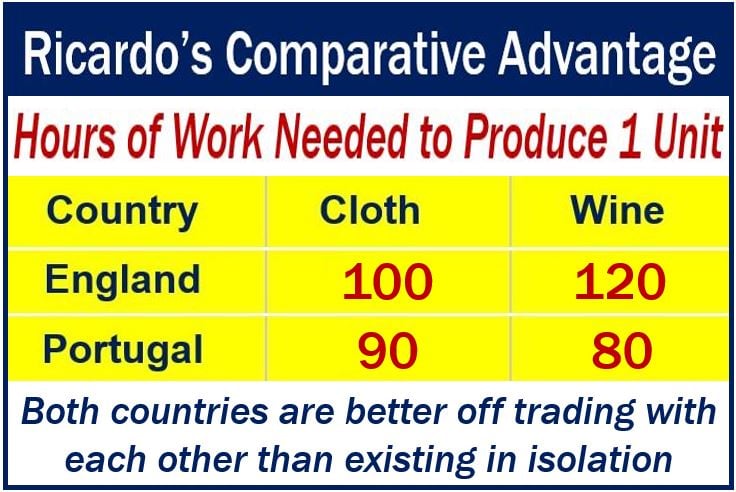Ricardo’s comparative advantage refers to a comparison the British economist made between England and Portugal. David Ricardo was an early 19th-century British political economist. He believed in free trade and a free-market economic system. His writings and concepts continue influencing economic thinking today.
Comparative advantage is an economic theory. It states that two countries are better off if they trade instead of trying to be completely self-sufficient. Even if one country is better at making all goods than another, the two nations should still trade.
In Ricardo’s comparative advantage, he compared England and Portugal. The two countries produced cloth and wine of equal quality. Portugal presumably could produced both wine and cloth in fewer hours than England.
However, the relative costs of producing cloth and wine differed between the two nations.

Look at the table above, England needed 100 labor hours to produce one unit of cloth or 5/6 of a unit of wine. Meanwhile, Portugal required 90 hours of labor to make one unit of cloth or 9/8 of a unit of wine.
Therefore, Portugal had an absolute advantage in making cloth due to fewer labor hours. England, on the other hand, had a comparative advantage due to lower opportunity cost.
Ricardo’s comparative advantage – what if?
What would happen if the two countries did not trade? England would need 220 labor hours to produce as well as consume one unit each of cloth and wine. Portugal, on the other hand, would require 170 hours to do the same.
England could produce cloth more efficiently that wine, while for Portugal it is the other way round. Therefore, if England and Portugal specialized in cloth and wine making respectively, their combined total production would increase.
England could spend 220 labor hours making 2.2 units of cloth while Portugal could spend 170 hours making 2.125 units of wine.
What would happen if England specialized in cloth and Portugal in wine? England could trade one unit of its cloth for 5/6 to 9/8 units of Portuguese wine.
Then both nations could consume at least one unit each of cloth and wine, with 0 to 0.2 units of cloth and 0. to 0.125 units of wine remaining in each respective nation. They could either export or consume the remaining amount.
They could both consume more wine and cloth by trading than by being self-sufficient (autarky).
Do not confuse the term with ‘competitive advantage.’ Competitive advantage refers to the characteristics that give a company an edge over its competitors regarding a product.
Examples of competitive advantage include price, quality, credit terms, and longer-lasting guarantees. Competitive advantage may also include faster delivery times and access to raw materials.
Ricardo’s comparative advantage was illustrated in his 1817 book – On the Principles of Political Economy and Taxation.
